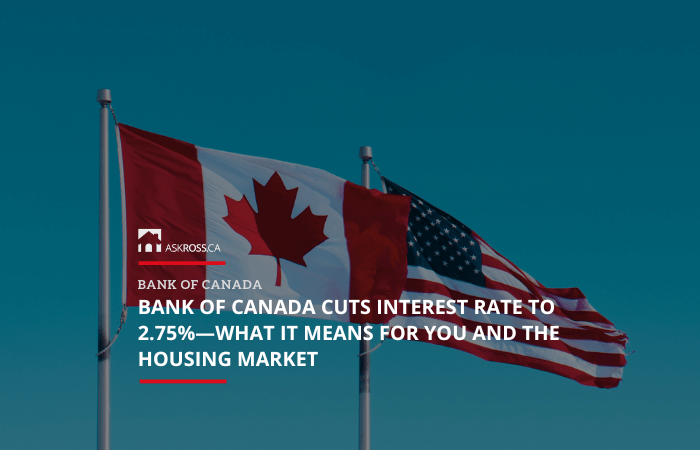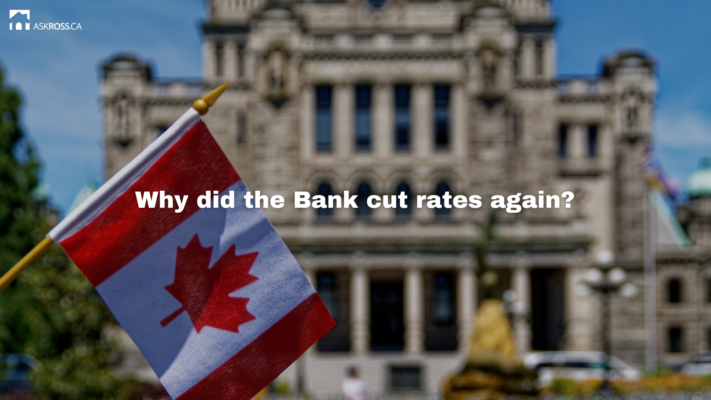
Published: March 13th, 2025 • Last Updated: March 25th, 2025
Author: Ross Taylor on AskRoss.ca
Bank of Canada Cuts Interest Rate to 2.75%—What It Means for You and the Housing Market
Escalating trade tensions with the U.S. have forced the Bank of Canada’s hand. President Donald Trump’s aggressive tariff measures are injecting uncertainty into Canada’s economic outlook, leaving policymakers little choice but to respond.
As a result, the Bank of Canada (BoC) has cut its benchmark interest rate by 25 basis points (bps) to 2.75%—its seventh consecutive cut.
This move brings the retail prime rate down to 4.95%. That’s big news for variable-rate mortgage holders, who will see immediate changes to their borrowing costs. It also signals that Canada’s economy may be in for a bumpy ride.
The Bank of Canada (BoC) was originally expected to pause after January’s cut, but last week’s trade war developments forced policymakers to reassess.
So, what does this mean for your mortgage? Where is the economy headed next? Let’s dive in.
Jump to a section in the article ↓↓
- Understanding U.S. tariffs and their impact on Canada
- Why did the Bank cut rates again?
- What does this rate cut mean for your mortgage?
- The big question: Will the Bank of Canada cut its rates again in April?
- How does the U.S. economy factor into this?
- Advice From Ross Taylor Mortgages
Understanding U.S. tariffs and their impact on Canada
Tariffs are essentially taxes that countries impose on goods and services imported from other nations. They play a vital role in shaping trade policies and can have profound impacts on both domestic and international economies.
In the U.S., tariffs are taxes levied on goods imported from other countries, including Canada. Recently, these tariffs have been applied to Canadian steel and aluminum, among other products.
This means that when Canadian businesses export these goods to the U.S., they become more expensive for American consumers, which can make them less competitive in the market.
Why are U.S. tariffs impacting Canada?
These tariffs are having a significant impact on Canada because they increase costs for our businesses and consumers.
Higher costs and prices
- Tariffs make Canadian exports more expensive in the U.S., increasing costs for businesses that rely on American imports, and leading to higher prices for consumers.
Weaker economy and job losses
- Reduced exports slow economic growth, hitting key industries like manufacturing and forestry, which may lead to layoffs—especially in sectors like steel and aluminum.
Uncertainty and trade disruptions
- Ongoing trade tensions and “retaliatory tariffs” create instability, discouraging business investment, slowing consumer spending, and disrupting supply chains.
Back to the list at the top ↑↑

Why did the Bank cut rates again?
According to Bank of Canada Governor Tiff Macklem, “pervasive uncertainty” surrounding U.S. tariffs is hurting consumer spending and business investment, forcing the Bank to act.
The biggest concern? If trade tensions continue to escalate, Canada’s economy could be facing a significant slowdown.
- New U.S. tariffs on Canadian steel and aluminum (25%) are already in effect, adding cost pressures to key industries.
- Additional tariffs on Canadian imports are set to take effect April 2nd, unless negotiations change course.
- Markets have reacted sharply, with a sell-off in stocks and growing fears of a U.S. recession.
Economists estimate that a prolonged trade war could knock 3% off Canada’s GDP over the next two years, reducing business investment by 12% and exports by 8.5%.
In short, the BoC is cutting rates to counteract trade-related economic threats, even as inflation pressures loom in the background.
Back to the list at the top ↑↑

What does this rate cut mean for your mortgage?
Variable-rate mortgage holders
Expect a drop in your payment or a shorter amortization period (if your payment stays the same).
- With bank prime rates resetting to 4.95% overnight, insured variable rates could dip as low as 3.90%, while uninsured rates may land around 4.25%.
- That translates to about $240 in annual savings per $100,000 borrowed—real money in your pocket.
For fixed-rate mortgage holders
There’s no immediate change. Fixed rates follow bond yields, not the overnight rate.
- However, if bond yields react to this shift, we could see some movement in fixed-rate offers down the line—especially for those up for renewal.
For new homebuyers, refinancers, or renewals
This could be a strategic time to lock in a competitive rate before further market fluctuations.
- With the gap between fixed and variable rates shrinking, variable mortgages may become more appealing.
- Some homebuyers might feel encouraged to jump into the market, though broader economic concerns could keep others on the sidelines.
- Renewing borrowers may find some relief from sticker shock, while refinances may tick up slightly—but likely not dramatically.
With another BoC meeting scheduled for April 16th, it’s worth considering whether another rate cut is on the horizon—or whether the Bank will pause if inflationary pressures mount.
Back to the list at the top ↑↑
The big question: Will the Bank of Canada cut its rates again in April?
Right now, markets are pricing in a 47% chance of another 25 bps cut at the April 16th meeting—which will come just two weeks after Trump’s next round of tariffs on Canada is set to kick in.
However, inflation is the wildcard. If prices start rising due to tariff-related supply chain disruptions, the BoC could be forced to rethink further cuts.
“If inflation awakens from hibernation, Macklem and his squad will slam the easing brakes so hard the bond market might get whiplash.” – MortgageLogic.news
Key inflation indicators to watch include:
- Core inflation trends
- Wage growth
- Consumer inflation expectations
- The percentage of CPI components growing over 3% (a metric the BoC is increasingly relying on)
Some economists warn that if trade uncertainty continues, rates could drop below 2% by the end of the year.
Others believe that if tariffs are rolled back, the BoC could pause at 2.75%—already within its estimated “neutral rate range”—the level where monetary policy neither stimulates nor slows economic growth.
Think of the neutral rate as the BoC’s guiding post, helping it strike a balance between economic stability and inflation control.
For now, the 5-year Canadian Mortgage Bond (CMB) rate remains stable, but given the unpredictability of trade policy, markets could shift quickly.
Back to the list at the top ↑↑
How does the U.S. economy factor into this?
It’s not just Canada feeling the heat—the U.S. yield curve has inverted again, often a warning sign of an economic downturn.
The U.S. job market added 232K new openings, but many economists believe this data doesn’t yet reflect the true impact of tariffs and government layoffs.
“Despite Canada’s potential tradepocalypse, banks continue to rake in profits.” – MortgageLogic.news
This disconnect between economic risks and financial markets is something to watch. If U.S. growth stumbles, it could have knock-on effects for Canada, possibly leading to further rate cuts.
Back to the list at the top ↑↑
Advice From Ross Taylor Mortgages
The Bank of Canada’s latest rate cut is a direct response to economic uncertainty fueled by U.S. trade tensions. While lower rates bring some relief to mortgage holders, they also signal potential economic challenges ahead.
- If you’re in a variable-rate mortgage
Enjoy the payment drop, but stay in touch with your mortgage broker to monitor further changes. - If you’re renewing your mortgage in the next 12 months
This could be a great time to lock in a competitive fixed rate before markets shift again. - If you’re buying or refinancing
With rates this low, it’s worth running the numbers to see if a refinance or early renewal makes sense.
The next BoC meeting is April 16th—and all eyes will be on whether tariffs push the Bank toward another rate cut.
If you’re unsure how this rate cut affects you, reach out today. Let’s review your mortgage strategy and ensure you’re positioned for whatever comes next.
Back to the list at the top ↑↑

Ross Taylor Mortgages
If you want great service from someone you can trust – reach out to us today.
Get quick answers to your questions, no matter how difficult – 7 days a week.

 Apply For a Mortgage
Apply For a Mortgage